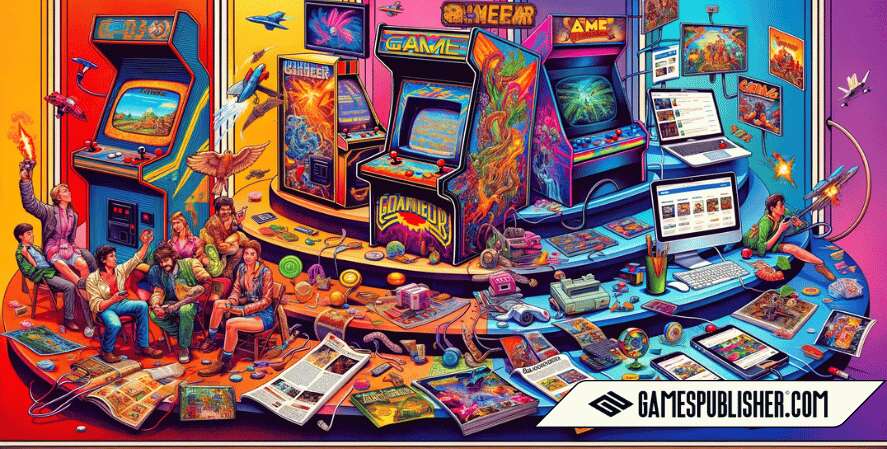In today’s digital age, social media has permeated every facet of our lives, exerting a profound influence on various sectors, including entertainment, commerce, and communication. One of the industries where social media has had a transformative impact is the game publishing industry.
This article explores how game developers and publishers can harness the power of social media to enhance their marketing strategies and foster robust community engagement.
Social media serves a dual role in the game publishing sector. Not only is it an effective marketing tool that reaches millions of potential players worldwide, but it also serves as a platform for building and nurturing gaming communities, thereby enhancing engagement and promoting sustained interaction.
This dual capability makes social media an indispensable asset in the video game industry’s arsenal.
The Evolution of Game Marketing

Historically, game marketing relied heavily on traditional media such as print advertisements, television commercials, and physical promotional events. However, with the rise of digital platforms, there has been a significant shift toward online and social media marketing strategies.
Consequently, developers and publishers now emphasize digital content, which can further engage the audience more directly and therefore enhance promotional efforts.
However, the digital revolution has notably shifted the focus towards online platforms, and as a result, social media has emerged as a pivotal channel for promoting video games.
Platforms like YouTube, Facebook, X, and TikTok have become central to the marketing strategies of video game publishers.
These platforms allow for direct interaction with gamers, thereby providing a means to not only promote games but also, importantly, to gauge player reactions and feedback in real-time. Consequently, this interaction enhances the gaming experience and fosters a closer community.
Social Media Platforms for Game advertisement

YouTube
YouTube plays a critical role in game marketing through its live streaming services and its dedicated gaming section, YouTube Gaming Live.
This platform enables publishers to engage with a diverse audience via game trailers, live streams of gameplay, and interactive Q&A sessions, making it a vital tool for game promotion.
Facebook connects gamers globally and supports community-building through features like the dedicated gaming tab and instant gaming experiences in Messenger.
Its infrastructure supports a wide array of content types, from live gaming sessions to community discussions, making it a versatile tool for game publishers.
X previously known as twitter
X is invaluable for sharing quick updates, gaming news, and trends.
A significant portion of X’s user base consists of gaming enthusiasts, making it an excellent platform for real-time communication and hype-building around game launches and updates.
TikTok
TikTok has become a powerhouse for viral gaming content, especially among younger audiences. Consequently, creators are finding innovative ways to engage with this dynamic demographic, leading to a surge in interactive and visually appealing gaming challenges.
Its algorithm excels at promoting engaging content, and its easy-to-use video creation tools allow game publishers to produce captivating, shareable game clips and trailers that can reach a broad audience quickly.
Strategies for Leveraging Social Media

Defining the Audience
Understanding the target audience is crucial for tailoring social media strategies effectively. Game publishers need to identify the demographics, gaming preferences, and social media habits of their potential players to craft compelling and relevant content.
Pre-launch Strategy
Implementing a robust pre-launch strategy is essential. Tactics such as releasing teaser trailers, offering behind-the-scenes glimpses, and providing exclusive offers can effectively generate anticipation and engagement. Consequently, these strategies foster excitement well before the game’s release.
Leveraging Live Streams
Live streaming is a dynamic tool for maintaining user engagement. By broadcasting live gameplay and developer interactions, publishers can create a sense of community and immediacy, encouraging players to participate and share the content.
Collaborating With Streamers
Furthermore, by partnering with influencers and streamers, a game’s visibility can be significantly amplified. Consequently, this strategy not only boosts engagement but also potentially increases the game’s overall success. Influencers bring dedicated audiences, whose trust and enthusiasm can lead to increased game adoption and visibility.
Creative Content Ideas
Game publishers should consider diverse content strategies to keep their audience engaged. Ideas include sharing gameplay tips, hosting giveaways, introducing game characters, and conducting polls or Q&A sessions to foster a deeper connection with the community.
Addressing the Challenges
Social media offers many opportunities for game marketing. However, this approach presents challenges. Moreover, it requires careful planning and consideration of potential risks. Furthermore, implementing changes based on this approach demands significant resources and time.
Therefore, it is crucial to evaluate the benefits against the possible drawbacks. These include content saturation and a need for authenticity. Overcoming these challenges requires innovative content creation and genuine community engagement strategies, ensuring that interactions are personal and meaningful.
The Future of Social Media in Game Publishing
As social media platforms evolve, their impact on game marketing and community building is likely to grow. Staying adaptive and innovative is essential for game publishers aiming to leverage these platforms effectively.
Upcoming trends will transform game publishing on social media. These include virtual reality integration and AI-driven personalized marketing strategies.
Conclusion
Social media has become a critical element in the success of game publishing. Game developers and publishers can enhance marketing by using platforms like YouTube, Facebook, X, and TikTok. This approach helps build vibrant, engaged gaming communities.
As the digital landscape continues to evolve, the importance of social media in the gaming industry cannot be overstated. Game publishers are encouraged to embrace these digital tools to maximize their reach and impact in the gaming world.

